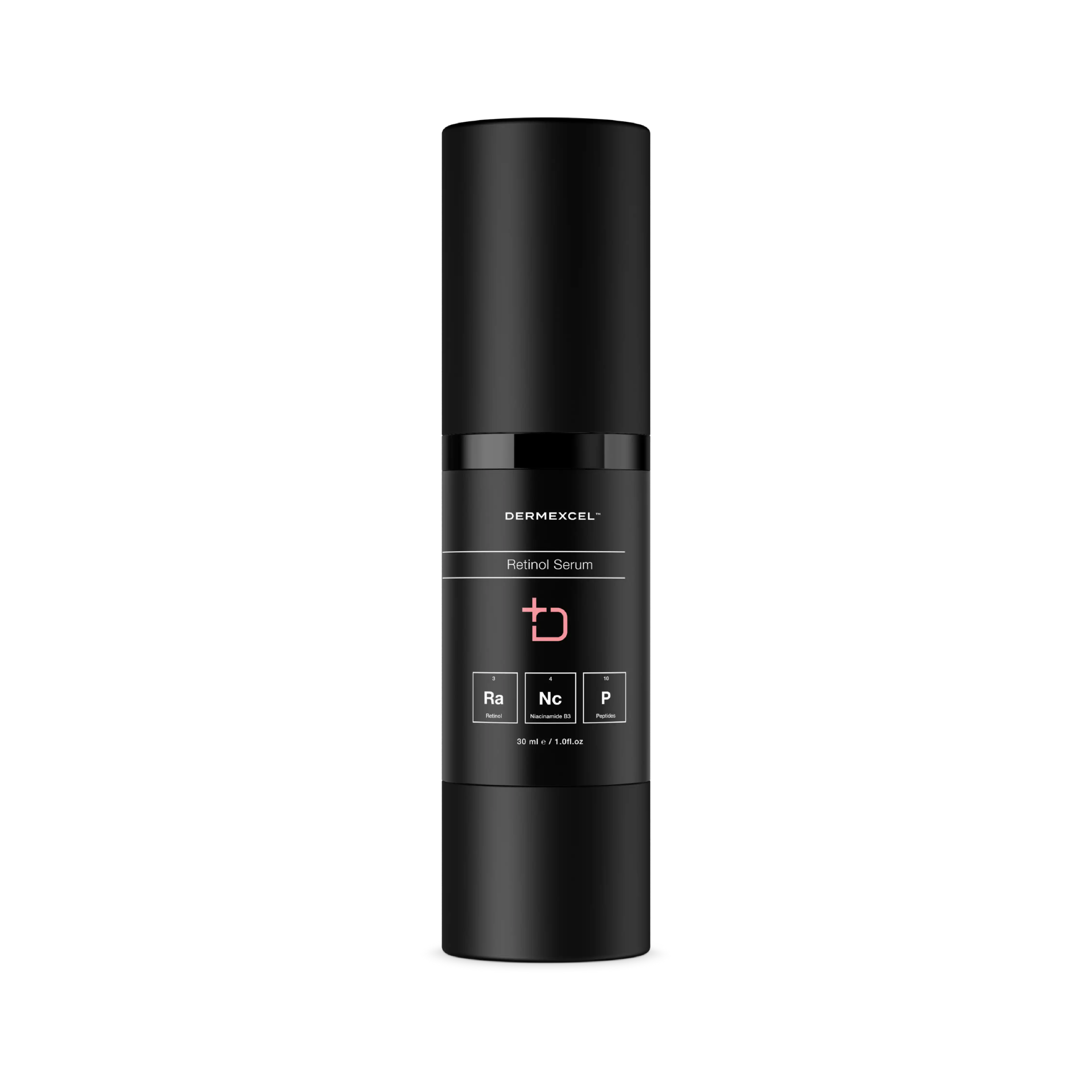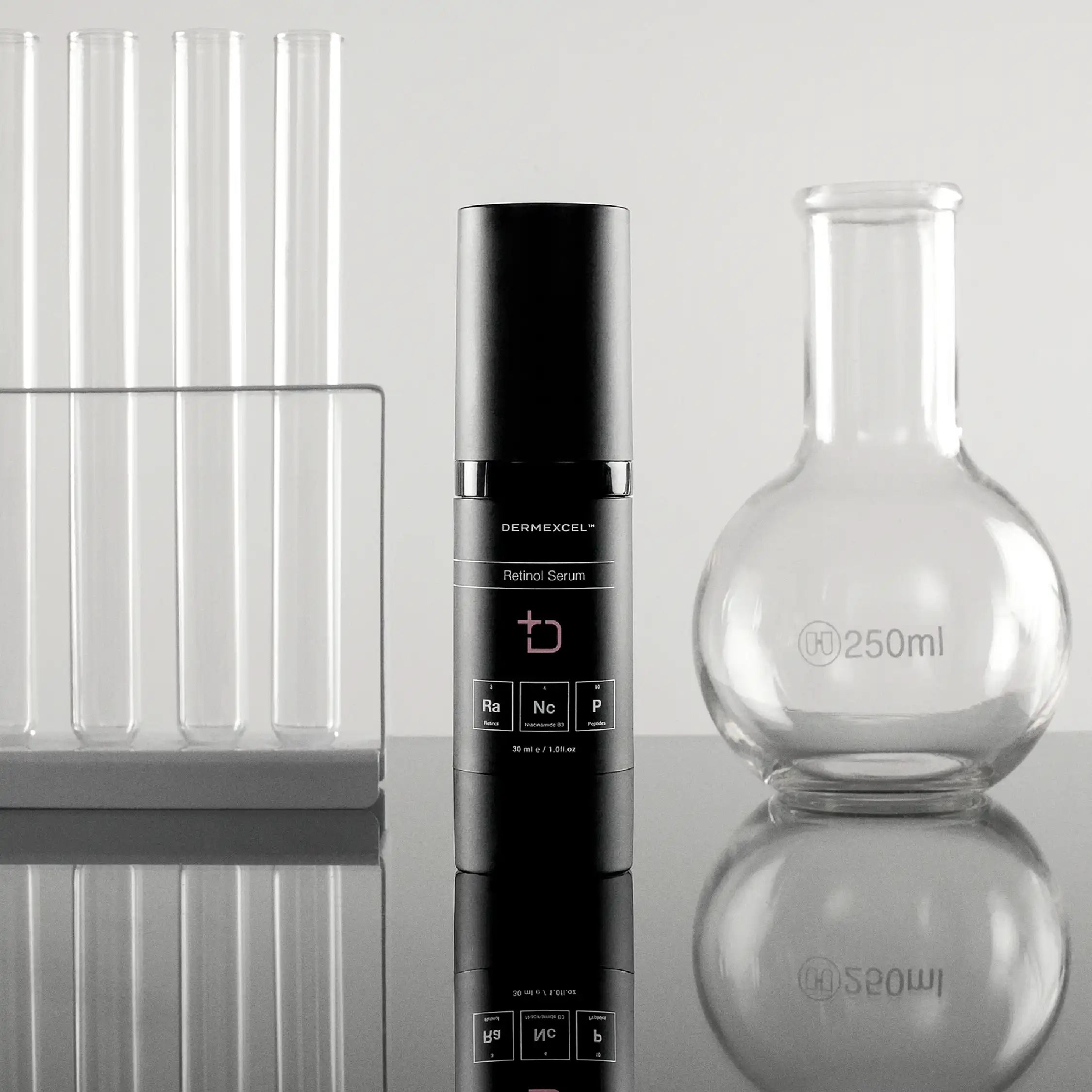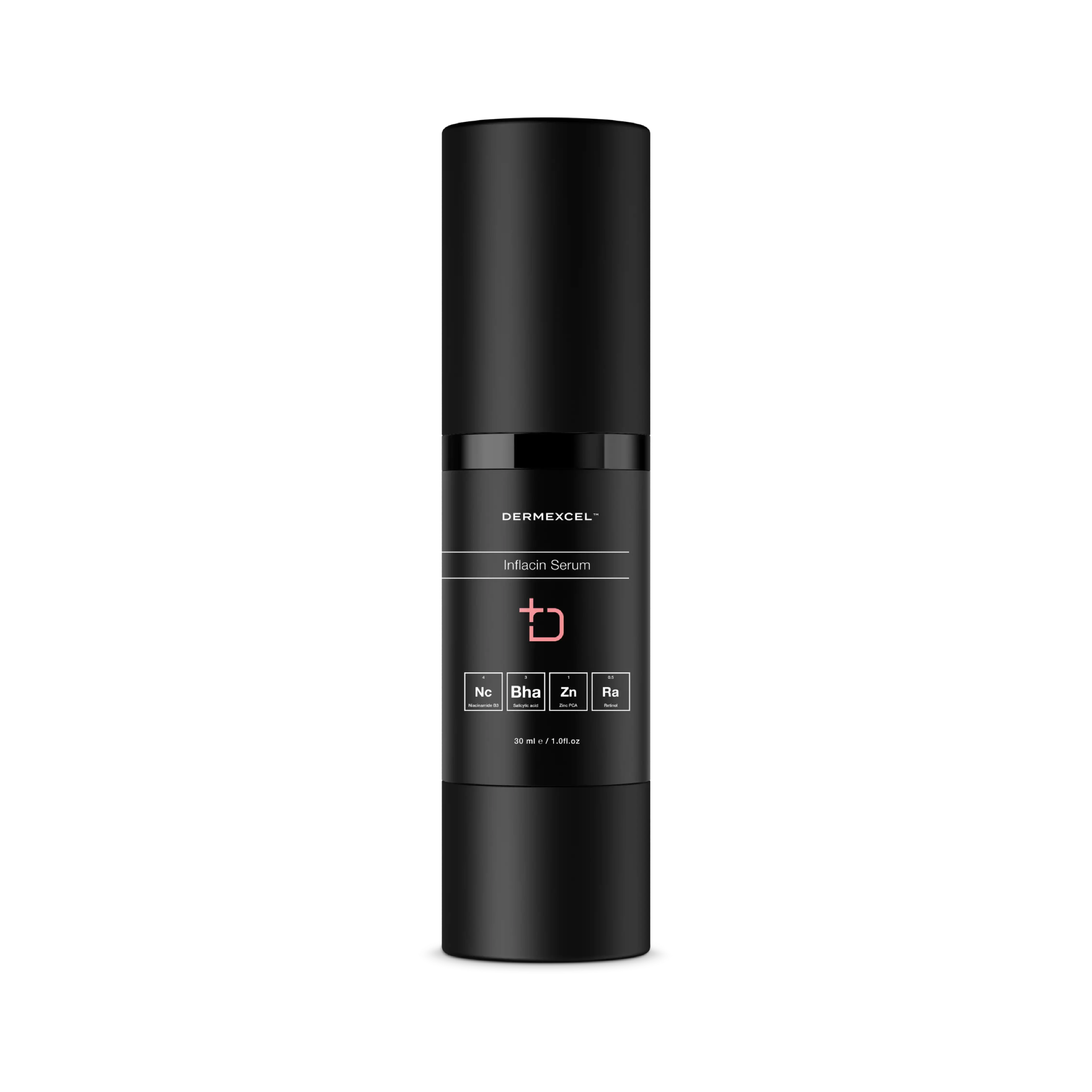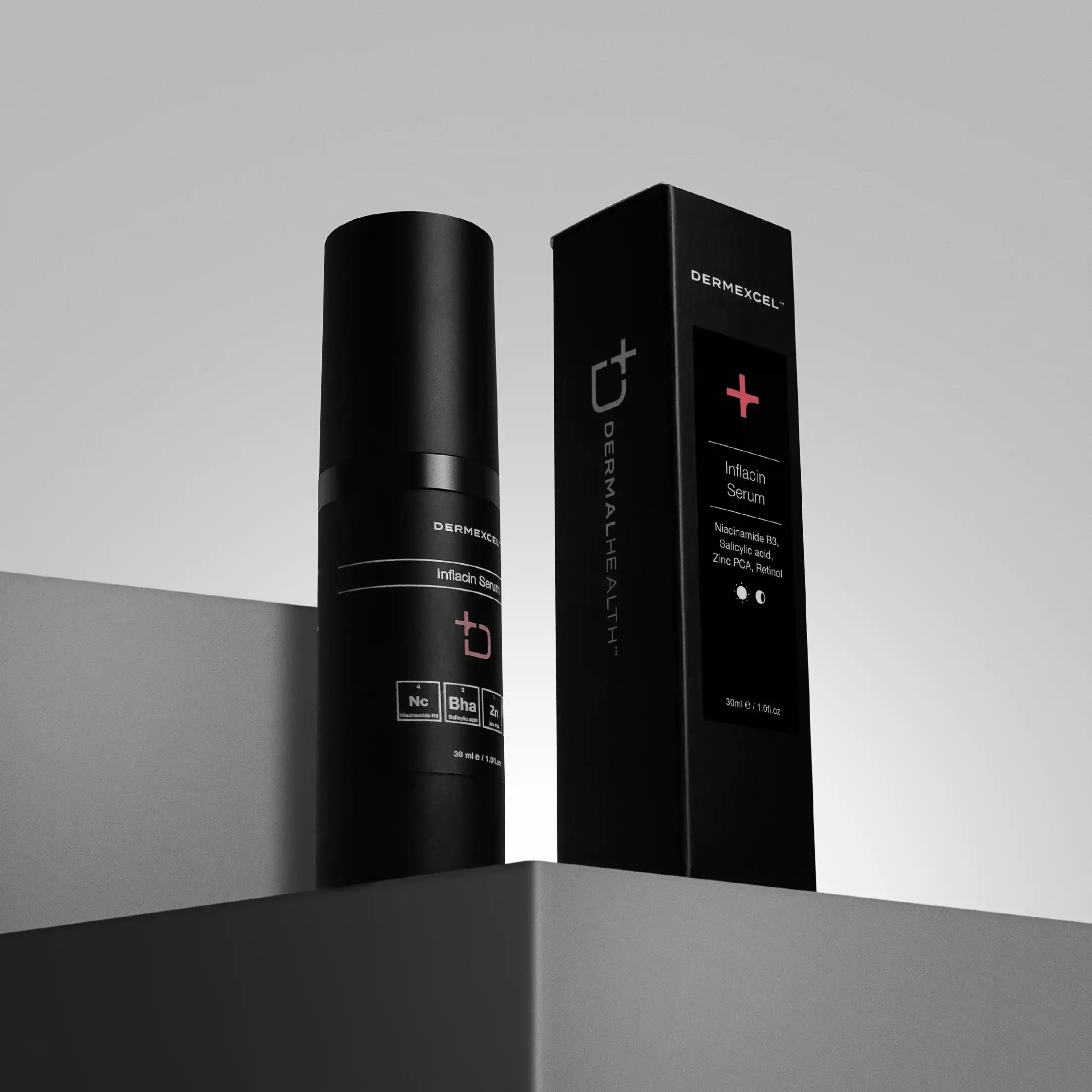The Role Of Retinoids
The general consensus among dermatologists is that you should start using retinol products in your 20s for anti-aging reasons. From evening out skin tone and texture to boosting radiance and preventing blemishes, it is a real multitasker that can suit all skin types.
Everyone’s complexion ages differently—some may need it earlier, others later. If you are dealing with breakouts, pigmentation from UV rays or age spots, fine lines from collagen breakdown, or dullness, you will benefit greatly from adding retinol to your regimen.

Inside our skin, we have retinol receptors called retinoic acid receptors (RAR) and retinoid X receptors (RXR). When you apply prescription retinol, known as Retin-A or retinoic acid, the retinol acts on those receptors to speed up skin cell production. Old cells die faster, making way for new, young, healthy cells. Retinol also encourages collagen production, so essentially, it triggers your skin to act younger.
Once inside the skin, over-the-counter retinol has to undergo a conversion process before it can act on the receptors, which means it is less likely to irritate than stronger prescription retinol.

Retinoic Acid (retin-A or tretinoin) is potent and only available with a prescription.
- Conversion: No conversion is needed; it is already in the active form. It binds directly to the retinoid receptors to activate a biological response.
- Efficacy: Highly effective as it binds directly to the retinoid receptors and activates a biological response. It acts immediately on receptors for fast and furious results.
- Side Effects: Depending on the percentage, it can cause severe and uncomfortable side effects, including redness and peeling, even if you don't have sensitive skin.

Also known as granactive retinoid. It's an ester of the prescription retinoic acid and the hottest new retinol on the block. This molecule is unique in that it processes innate retinoic acid activity, and thus does not need to undergo metabolic breakdown to achieve skin benefits. It has been demonstrated to be more stable and cause less skin irritation than Retinoic acid, or any other less effective form of Vitamin A.
- Conversion: It works directly on receptors in the skin, just like retinoid acid, but it has little to no downtime, making it ideal for anyone who does not want to risk irritation and wants quick results.
- Efficacy: Highly effective as it binds directly to the retinoid receptors and activates a biological response. It acts immediately on receptors for fast and furious results.
- Side Effects: There are no side effects, as it does not bind to the specific receptor that causes them.

An OTC vitamin A derivative that we have all heard of.
- Conversion: Once applied, it sinks into the skin and is converted to retinaldehyde and then to retinoic acid.
- Efficacy: Potency and efficacy depend on product formulation, pH, and Retinol concentration.
- Side Effects: Depending on the percentage, it can cause redness and peeling if your skin is slightly sensitive. The best way to avoid side effects is to use it two nights a week, see how your skin reacts, and once it becomes more accustomed to the retinol ingredient, gradually work your way up to three nights and then four.

An OTC vitamin A derivative proven in clinical studies to be the least effective form of Retinol.
- Conversion: Retinyl palmitate does not penetrate the skin very well. Once applied, it must undergo significant complex conversions before binding to RA receptors to yield a biological response.
- Efficacy: The literature does not provide significant evidence supporting the effectiveness of topical retinyl-palmitate as an antiaging agent.
- Side Effects: Because of the low efficacy profile, there is little to no risk for side effects.

DermExcel Retinol serum contains 3% GranActive Retinoid - Hydroxypinacolone Retinoate (HPR).

DermExcel's Retinoid Molecule
The typical retinol molecule must be converted to the active form (all-trans retinoic acid) before binding to the retinoid receptors to activate a biological response, all dermatological benefits.
Because of this conversion, studies indicate that 1% Retinol is about 20 times weaker than the active form of Retinoic acid. 1% Retinol, equivalent to about 0.05% Retinoic acid.
The HPR retinoid molecule needs no conversion to bind to Retinoid receptors as it’s already in the active form. It binds directly to the retinoid receptor without causing irritation.
The typical retinol molecule and the newly advanced HPR retinoid molecule (included in Granactive Retinol) are two totally different molecules, and therefore, a conversion calculation would be almost impossible. However, it is safe to say that 3% of the Granactive retinoid molecule yields significantly more retinoid receptor binding activity than 1% retinol (the highest percentage of retinol in non-prescription products).
Other active ingredients in the DermExcel Retinol formulation:
This formulation also contains superior active ingredients, complementing the advanced HPR molecule.
- Argireline - This hexapeptide relaxes the muscles responsible for forming expression lines. It impairs the release of neurotransmitters, resulting in weakened facial contractions, thus inhibiting the formation of wrinkles.
- Matrixyl 3000 - Composed of two peptides that work synergistically to restore and maintain the skin’s youthful appearance by signaling to cells to produce more collagen. Numerous studies have proven the anti-aging and anti-wrinkle efficacy of Matrixyl 3000.
- Niacinamide - Also known as vitamin B3 and nicotinamide, niacinamide works with the natural substances in your skin to help visibly minimize enlarged pores, tighten lax pores, improve uneven skin tone, soften fine lines and wrinkles, diminish dullness, and strengthen a weakened surface. Niacinamide also reduces the impact of environmental damage because of its ability to improve the skin’s barrier (its first line of defense), plus it also plays a role in helping skin to repair signs of past damage. Left unchecked, this daily assault makes skin appear older, dull, and less radiant.
DermExcel Retinol Serum contains 3% GranActive Retinoid - Hydroxypinacolone Retinoate (HPR).
retinoid molecule comparison
| stability | very high |
| irritation | low |
| efficacy | high |
| key notes |
|
| stability | moderate |
| irritation | moderate |
| efficacy | moderate |
| key notes |
|
| stability | low |
| irritation | high |
| efficacy | high |
| key notes |
|
| stability | low |
| irritation | very high |
| efficacy | very high |
| key notes |
|
| Hydroxypinacolone Retinoate (HPR) | Traditional Retinol | Retinaldehyde | Retinoic acid | |
|---|---|---|---|---|
| stability | very high | moderate | low | low |
| irritation | low | moderate | high | very high |
| efficacy | high | moderate | high | very high |
| key notes |
|
|
|
|
DermExcel™
Retinol Training
DermExcel™
Retinol Products






Pay interest-free installments from R 335.00 with various payment gateways selected at checkout.
SIZE: 30 mL

Unclog Pores

Minimize Pores

Smooth Skin

anti-aging

DNA repair
A scientifically formulated skincare solution with state-of-the-art active ingredients. Retinol Serum stimulates epidermal growth and counters signs of aging, reducing hyperpigmentation and promoting collagen and elastin growth, vital for skin elasticity and structure.
Retinol Serum supports skin cell health, protecting skin cells from environmental stressors and aiding acne treatment. Its advanced formulation stimulates collagen production, reduces inflammation, inhibits pigmentation, and accelerates cell turnover. It also aids in combating acne by reducing sebum production and unclogging pores.
Retinoic acid analogue
Retinoic acid, often referred to as tretinoin in its pharmaceutical form, is the active form of Vitamin A. It is widely recognized for its powerful effects in dermatology and skin care, particularly in treating acne and signs of skin aging.
Retinoic acid works at the cellular level to modify gene expression and affect cell growth. In treating acne, it promotes the turnover of skin cells, reducing the likelihood of pore-clogging and helping to clear existing breakouts. Additionally, it decreases the cohesiveness of follicular epithelial cells, further preventing the formation of comedones.
Retinoic acid's ability to stimulate collagen production is a key benefit in anti-aging skincare. This leads to a reduction in fine lines and wrinkles and an improvement in overall skin texture and tone. It also aids skin discoloration and hyperpigmentation by accelerating cell turnover, bringing new skin cells to the surface faster, and shedding pigmented and damaged cells.
Despite its benefits, retinoic acid can irritate the skin, causing side effects like redness, dryness, and peeling, especially during the initial period of use. Its potency means it is generally available by prescription and requires careful monitoring by a healthcare professional.
Hydroxypinacolone Retinoate (HPR) is a newer, esterified form of retinoic acid. Unlike cosmetic retinol, HPR binds directly to the retinoid receptors of the skin cells without needing conversion. This direct binding allows it to deliver similar benefits to retinoic acid, such as stimulating collagen production, improving skin elasticity, and reducing signs of aging, but with a lower risk of irritation.
HPR is considered more gentle and less irritating than traditional retinoic acid while offering comparable benefits. With HPR, everyone has access to the benefits of prescription retinoids without the risk of side effects.
Physiological Effects
- Cell Turnover and Renewal: HPR promotes rapid cell turnover, aiding in the exfoliation of dead skin cells and generating new cells.
- Skin Texture: Promoting cell renewal improves skin texture and addresses issues like roughness and dullness.
- Collagen Production: It stimulates collagen production, which is essential for reducing the appearance of fine lines and wrinkles and improving skin elasticity.
- Acne Treatment: Effective in treating acne by unclogging pores and reducing the size of sebaceous glands, it diminishes both inflammatory and non-inflammatory acne lesions.
- Pigmentation: It can reduce hyperpigmentation by accelerating the turnover of hyperpigmented skin cells and inhibiting melanin production.
- Photoaging: Effective in treating signs of photoaging, reversing some of the damage caused by UV radiation.
Special Benefits
- Retinoid Receptor Activity: HPR, an ester of retinoic acid, binds directly to retinoid receptors in the skin, enabling it to work without needing to be converted into retinoic acid.
- Lower Irritation: Typically, it causes less irritation than retinoic acid, making it more suitable for sensitive skin types.
- Collagen Stimulation and Anti-Aging: Like retinoic acid, HPR helps in stimulating collagen production and has anti-aging properties.
- Acne and Hyperpigmentation: It effectively treats acne and reduces hyperpigmentation, often with fewer side effects than retinoic acid.
- Stability and Penetration: HPR is more stable and lipid-soluble, so it penetrates the skin more effectively and is less prone to degradation.
References
- Zaenglein, A. L., Pathy, A. L., Schlosser, B. J., Alikhan, A., Baldwin, H. E., Berson, D. S., ... & Thiboutot, D. M. (2016). Guidelines of care for the management of acne vulgaris. Journal of the American Academy of Dermatology, 74(5), 945-973.e33.
- Fisher, G. J., Wang, Z. Q., Datta, S. C., Varani, J., Kang, S., & Voorhees, J. J. (1996). Pathophysiology of premature skin aging induced by ultraviolet light. New England Journal of Medicine, 337(20), 1419-1428.
- Truchuelo, M. T., Jiménez, N., Jaén, P. (2018). Assessment of the efficacy of a new complex-based retinoic acid and retinol in a 3-month study using objective methods and skin biomarker analysis. Journal of Cosmetic Dermatology, 17(3), 347-354.
- Mukherjee, S., et al. (2006). Retinoids in the treatment of skin aging: an overview of clinical efficacy and safety. Clinical Interventions in Aging.
- Randhawa, M., et al. (2015). Hydroxypinacolone retinoate: a new retinoid and its use in dermatology. Skin Therapy Letter.
Niacinamide
Niacinamide offers several benefits for the skin, primarily due to its anti-inflammatory and antioxidant properties. It reduces the redness and inflammation associated with acne, rosacea, and other inflammatory skin conditions. Additionally, niacinamide's ability to improve the skin's barrier function benefits all skin types, particularly those with eczema or mature skin.
Another significant benefit of niacinamide is its role in reducing hyperpigmentation. Studies have shown that it can decrease the transfer of melanin to the epidermis, helping to fade dark spots and even out skin tone.
Niacinamide also plays a role in reducing the visible signs of aging. It has been found to stimulate collagen production and improve skin elasticity, reducing fine lines and wrinkles. Its antioxidant properties further protect the skin from environmental damage, such as pollution and UV radiation, which contribute to premature aging.
The efficacy of niacinamide and its ability to address multiple skin concerns simultaneously has led to its growing popularity in both over-the-counter and prescription skincare formulations.
Physiological Effects
- Barrier Function Enhancement: Niacinamide helps strengthen the skin’s barrier function by increasing the production of ceramides, lipids that keep the skin hydrated and protect against environmental damage.
- Anti-inflammatory Properties: It has notable anti-inflammatory effects, which are beneficial in reducing redness and inflammation associated with acne, eczema, and other inflammatory skin conditions.
- Sebum Regulation: Niacinamide helps regulate sebum production, which controls excess oiliness and can benefit acne-prone skin.
- Hyperpigmentation Reduction: It reduces hyperpigmentation by inhibiting melanosome transfer from melanocytes to keratinocytes, leading to an even skin tone.
- Anti-aging Effects: Niacinamide helps reduce the appearance of fine lines and wrinkles by boosting collagen production and improving skin elasticity.
- Antioxidant Activity: It has antioxidant properties, protecting the skin from oxidative stress and environmental aggressors like UV radiation and pollution.
Managing Dermatological Conditions
- Acne and Oily Skin: Niacinamide effectively manages acne and oily skin by regulating sebum and reducing inflammation.
- Hyperpigmentation and Melasma: Its ability to reduce melanin transfer benefits it in treating hyperpigmentation and melasma.
- Aging Skin: Niacinamide targets wrinkles and loss of firmness.
- Skin Barrier Disorders: Niacinamide is beneficial in treating skin barrier disorders like atopic dermatitis and eczema by enhancing barrier function and hydration.
- Photodamage and Skin Protection: It helps mitigate the effects of photodamage and provides some degree of protection against environmental damage.
References
- Gehring, W. (2004). Nicotinic acid/niacinamide and the skin. Journal of Cosmetic Dermatology.
- Bissett, D. L., Oblong, J. E., & Berge, C. A. (2005). Niacinamide: A B vitamin that improves aging facial skin appearance. Dermatologic Surgery.
- Snaidr, V. A., Damian, D. L., & Halliday, G. M. (2019). Nicotinamide for photoprotection and skin cancer chemoprevention: A review of efficacy and safety. Experimental Dermatology.
- Navarrete-Solís, J. et al. (2011). A Double-Blind, Randomized Clinical Trial of Niacinamide 4% versus Hydroquinone 4% in the Treatment of Melasma. Dermatology Research and Practice, 2011.
Peptides
Peptides are short chains of amino acids with a wide range of biological functions and skin benefits. They are essentially small fragments of proteins, which are fundamental components of all living cells, including collagen and elastin in the skin.
In skincare, peptides are known for enhancing skin repair and rejuvenation. They function as signaling molecules, instructing cells to perform specific tasks such as producing collagen and elastin, vital for maintaining the skin's firmness and elasticity. This makes peptides especially beneficial in anti-aging products, as they can help reduce the appearance of fine lines and wrinkles.
Research has shown that certain peptides can improve skin barrier function, increase hydration, and soothe skin inflammation. This makes them suitable for products targeting dry, sensitive, or inflamed skin.
Peptides, with their diverse functions in promoting collagen production, strengthening the skin barrier, wound healing, and anti-inflammatory actions, are pivotal in managing various dermatological conditions, particularly in anti-aging, sensitive skin care, and wound healing applications.
Physiological Effects
- Collagen Production: Certain peptides, known as signal peptides, stimulate collagen production in the skin, enhancing skin firmness and reducing the appearance of fine lines and wrinkles.
- Skin Barrier Strengthening: Peptides can strengthen the skin barrier, improve hydration, and protect against environmental damage.
- Wound Healing: Some peptides play a role in the skin's natural healing process, aiding tissue repair and regeneration.
- Anti-Inflammatory Effects: Certain peptides have anti-inflammatory properties, helping to soothe and calm irritated skin.
- Antimicrobial Action: Some peptides possess antimicrobial properties, potentially helping to manage acne and other skin infections.
Managing Dermatological Conditions
- Aging Skin: Peptides can stimulate collagen production and improve skin elasticity.
- Sensitive Skin Conditions: Peptides are beneficial for sensitive or inflamed skin due to their soothing properties.
- Acne-Prone Skin: Antimicrobial peptides can be effective in acne treatment formulations.
- Wound Care and Repair: Peptides improve wound healing and reduce scarring.
References
- Gorouhi, F., & Maibach, H. I. (2009). Role of topical peptides in preventing or treating aged skin. International Journal of Cosmetic Science.
- Schagen, S. K. (2012). Topical peptide treatments with effective anti-aging results. Cosmetics.
- Varani, J., et al. (2001). Vitamin A antagonizes decreased cell growth and elevated collagen-degrading matrix metalloproteinases and stimulates collagen accumulation in naturally aged human skin. Journal of Investigative Dermatology.
Matrixyl 3000
Matrixyl 3000: The Powerhouse of Anti-Aging Peptides
Matrixyl 3000, a trademarked peptide composition, has revolutionized the approach towards anti-aging in dermatological products. This innovative ingredient combines two peptides, Palmitoyl Tripeptide-1 and Palmitoyl Tetrapeptide-7. The synergy of these peptides enhances skin repair and reduces the appearance of aging.
Physiological Effects
- Collagen and Elastin Stimulation: Matrixyl 3000 promotes the production of collagen and elastin, key proteins that provide skin structure and elasticity. This helps reduce the appearance of fine lines and wrinkles.
- Skin Repair and Regeneration: It aids in the skin's repair process, enhancing the overall texture and tone, and may help reverse the signs of aging.
- Anti-inflammatory Properties: Matrixyl 3000 can have anti-inflammatory effects, reducing inflammation and potentially aiding in skin repair.
- Hydration Enhancement: Improving the underlying skin structure can enhance hydration, leading to a plumper, more youthful appearance.
Managing Dermatological Conditions
- Aging Skin: Its primary use is in anti-aging skincare products to combat wrinkles, fine lines, and other signs of aging.
- Improving Skin Texture and Tone: Matrixyl 3000 can improve overall skin texture, which is beneficial for skin that has lost smoothness or become rough due to aging.
- Skin Elasticity: It can help improve skin elasticity, making it appear firmer and more toned.
Biochemical Mechanism and Clinical Efficacy
Matrixyl 3000 mimics the appearance of broken-down collagen, causing the skin to react by producing more collagen and elastin. Palmitoyl Tripeptide-1 is known for stimulating collagen synthesis and firming the skin, while Palmitoyl Tetrapeptide-7 reduces inflammation, a key contributor to aging.
Studies have shown that Matrixyl 3000 significantly improves skin elasticity and reduces wrinkle depth. A notable study published in the "International Journal of Cosmetic Science" demonstrated that Matrixyl 3000 reduced wrinkle volume and depth by up to 45% after 2 months of use (Smith, 2005).
Matrixyl 3000 stands out as a non-irritating, highly effective ingredient. Its role in stimulating collagen and elastin production and reducing inflammation is a cornerstone in anti-aging skincare regimens.
References
- Smith, J. (2005). "Effects of Matrixyl 3000 on Skin Aging." International Journal of Cosmetic Science.
- Sederma Inc., "Matrixyl 3000 Technical Overview."
- Blackburn, R. S., et al. (2005). Matrixyl 3000 restores skin's metabolic balance. Journal of Cosmetic Science.
- Lintner, K., et al. (2007). Matrixyl 3000: A new approach to anti-aging. Personal Care Magazine.
- Gorouhi, F., & Maibach, H. I. (2009). Role of topical peptides in preventing or treating aged skin. International Journal of Cosmetic Science.
Acetyl Hexapeptide-8
Acetyl Hexapeptide-8: The Innovative Peptide in Anti-Aging Dermatology
Acetyl Hexapeptide-8 is a testament to the advancements in peptide technology in dermatology. Its ability to reduce facial muscle contractions non-invasively positions it as an essential ingredient in anti-aging skincare.
Biochemical Mechanism
Acetyl Hexapeptide-8 functions by inhibiting the neurotransmitters that trigger muscle contractions. This action reduces the intensity of wrinkle-causing facial expressions, leading to a visible decrease in fine lines and wrinkles. It mimics the N-terminal end of SNAP-25, competing with this natural protein for a position in the SNARE complex, thereby destabilizing it. As a result, neurotransmitter release is diminished, and facial muscle contractions are softened.
Physiological Effects
- Neurotransmitter Inhibition: Acetyl Hexapeptide-8 works by inhibiting neurotransmitter release. This leads to reduced facial muscle contraction, a mechanism similar to Botox but less invasive.
- Reduction of Expression Lines: Helps to reduce the appearance of expression lines, particularly around the forehead and eyes, by limiting muscle contraction.
- Improvement in Skin Texture: Regular use can lead to smoother skin texture and a reduction in the depth and severity of wrinkles.
Special Benefits
Clinical Efficacy - Clinical studies have demonstrated the effectiveness of Acetyl Hexapeptide-8 in reducing wrinkle depth. A study published in the "International Journal of Cosmetic Science" reported that a cream containing 10% Acetyl Hexapeptide-8 reduced wrinkles by 30% over 30 days (Blanes-Mira et al., 2002).
References
- Blanes-Mira, C., et al. (2002). A synthetic hexapeptide (Argireline) with antiwrinkle activity. International Journal of Cosmetic Science.
- Wang, Y., et al. (2013). The anti-wrinkle efficacy of Argireline. Journal of Cosmetic and Laser Therapy.
- Ruiz, M. A., et al. (2007). New cosmetic formulations containing Argireline. Journal of Cosmetic Science.






Pay interest-free installments from R 219.00 with various payment gateways selected at checkout.
SIZE: 30 mL

Unclog Pores

↓ Sebum

Anti-Acne

↓ inflammation

anti-aging
A powerful combination of ingredients that target inflammation and acne, ensuring the skin remains hydrated while addressing common concerns such as pimples and blackheads.
The formula includes Salicylic acid, which excels at clearing clogged pores and diminishing acne-related redness. Zinc PCA is vital in controlling oil production and reducing problems associated with oily skin. Niacinamide helps to minimize the appearance of large pores and soothes skin conditions like acne and rosacea. Additionally, retinol promotes skin cell renewal, combats signs of aging, and improves the skin's texture and tone.
Inflacin Serum offers a comprehensive solution. It treats existing skin issues and prevents future problems, leading to a healthier complexion.
Niacinamide
Niacinamide offers several benefits for the skin, primarily due to its anti-inflammatory and antioxidant properties. It reduces the redness and inflammation associated with acne, rosacea, and other inflammatory skin conditions. Additionally, niacinamide's ability to improve the skin's barrier function benefits all skin types, particularly those with eczema or mature skin.
Another significant benefit of niacinamide is its role in reducing hyperpigmentation. Studies have shown that it can decrease the transfer of melanin to the epidermis, helping to fade dark spots and even out skin tone.
Niacinamide also plays a role in reducing the visible signs of aging. It has been found to stimulate collagen production and improve skin elasticity, reducing fine lines and wrinkles. Its antioxidant properties further protect the skin from environmental damage, such as pollution and UV radiation, which contribute to premature aging.
The efficacy of niacinamide and its ability to address multiple skin concerns simultaneously has led to its growing popularity in both over-the-counter and prescription skincare formulations.
Physiological Effects
- Barrier Function Enhancement: Niacinamide helps strengthen the skin’s barrier function by increasing the production of ceramides, lipids that keep the skin hydrated and protect against environmental damage.
- Anti-inflammatory Properties: It has notable anti-inflammatory effects, which are beneficial in reducing redness and inflammation associated with acne, eczema, and other inflammatory skin conditions.
- Sebum Regulation: Niacinamide helps regulate sebum production, which controls excess oiliness and can benefit acne-prone skin.
- Hyperpigmentation Reduction: It reduces hyperpigmentation by inhibiting melanosome transfer from melanocytes to keratinocytes, leading to an even skin tone.
- Anti-aging Effects: Niacinamide helps reduce the appearance of fine lines and wrinkles by boosting collagen production and improving skin elasticity.
- Antioxidant Activity: It has antioxidant properties, protecting the skin from oxidative stress and environmental aggressors like UV radiation and pollution.
Managing Dermatological Conditions
- Acne and Oily Skin: Niacinamide effectively manages acne and oily skin by regulating sebum and reducing inflammation.
- Hyperpigmentation and Melasma: Its ability to reduce melanin transfer benefits it in treating hyperpigmentation and melasma.
- Aging Skin: Niacinamide targets wrinkles and loss of firmness.
- Skin Barrier Disorders: Niacinamide is beneficial in treating skin barrier disorders like atopic dermatitis and eczema by enhancing barrier function and hydration.
- Photodamage and Skin Protection: It helps mitigate the effects of photodamage and provides some degree of protection against environmental damage.
References
- Gehring, W. (2004). Nicotinic acid/niacinamide and the skin. Journal of Cosmetic Dermatology.
- Bissett, D. L., Oblong, J. E., & Berge, C. A. (2005). Niacinamide: A B vitamin that improves aging facial skin appearance. Dermatologic Surgery.
- Snaidr, V. A., Damian, D. L., & Halliday, G. M. (2019). Nicotinamide for photoprotection and skin cancer chemoprevention: A review of efficacy and safety. Experimental Dermatology.
- Navarrete-Solís, J. et al. (2011). A Double-Blind, Randomized Clinical Trial of Niacinamide 4% versus Hydroquinone 4% in the Treatment of Melasma. Dermatology Research and Practice, 2011.
Salicylic acid
Salicylic acid, a renowned beta hydroxy acid (BHA), is a cornerstone in dermatology and skincare due to its exceptional keratolytic and comedolytic properties. Its unique ability to penetrate oil-laden hair follicle pores makes it particularly effective in treating acne-prone and oily skin types.
Salicylic acid dissolves skin debris (sebum and dead skin cells) that clogs pores and causes acne. It's a mild antibacterial and powerful anti-inflammatory agent that helps reduce the redness and swelling associated with breakouts.
What sets salicylic acid apart in dermatological treatments is its ability to exfoliate the skin, not just on the surface but within the pores themselves. This is due to its oil-soluble nature, which allows it to penetrate deep into the pores and dissolve the keratin plugs that lead to blackheads and whiteheads.
Furthermore, salicylic acid also has the capacity to adjust the pH of the skin, creating an environment less favorable for the growth of acne-causing bacteria. Salicylic acid's efficacy in treating various skin conditions, particularly acne, has been extensively documented in the scientific literature. Studies have consistently shown its ability to reduce acne lesions in terms of count and severity. Additionally, salicylic acid is highly recommended for its effectiveness in treating other skin conditions, such as psoriasis and dandruff, due to its ability to soften and remove scales and flakes from the skin.
Physiological Effects
- Keratolytic Action: Salicylic acid is known for its ability to exfoliate the skin by dissolving the intercellular 'glue' that holds skin cells together, helping to remove dead skin cells and unclog pores.
- Comedolytic Effect: It is particularly effective in reducing comedones (blackheads and whiteheads) by unclogging pores and preventing the formation of new comedones.
- Anti-inflammatory Properties: Salicylic acid reduces inflammation, which is beneficial in treating acne and other inflammatory skin conditions.
- Sebum Regulation: It helps to regulate oil production, making it a valuable ingredient for managing oily and acne-prone skin.
- Penetration Enhancement: Due to its lipophilic nature, it can penetrate sebum-filled follicles, effectively treating acne located deep within the pores.
Managing Dermatological Conditions
- Acne Vulgaris: Salicylic acid is a cornerstone in acne treatment, effectively preventing and treating existing acne lesions.
- Psoriasis: Its keratolytic properties make it helpful in softening and removing scales associated with psoriasis.
- Warts: Salicylic acid is commonly used to treat warts because it can exfoliate and remove thick skin.
- Seborrheic Dermatitis: It helps manage seborrheic dermatitis by reducing scaling and redness.
- Keratosis Pilaris: Salicylic acid can aid in smoothing the rough bumps associated with peratosis Pilaris.
References
- Zaenglein, A. L., Pathy, A. L., Schlosser, B. J., Alikhan, A., Baldwin, H. E., Berson, D. S., & Thiboutot, D. M. (2016). Guidelines of care for the management of acne vulgaris. Journal of the American Academy of Dermatology, 74(5), 945-973.e33.
- Kornhauser, A., Coelho, S. G., & Hearing, V. J. (2010). Applications of hydroxy acids: classification, mechanisms, and photoactivity. Clinical, cosmetic and investigational dermatology, 3, 135.
- Zander, E., & Weisman, S. (1992). Treatment of acne vulgaris with salicylic acid pads. Clinical Therapeutics.
- Gupta, A. K., & Nicol, K. (2004). The use of sulfur in dermatology. Journal of Drugs in Dermatology.
Zinc PCA
Zinc PCA, also known as Zinc Pyrrolidone Carboxylic Acid, is a skin care ingredient that combines the mineral zinc with a hydrating molecule PCA (Pyrrolidone Carboxylic Acid). It is renowned for its numerous benefits in skincare, particularly for its anti-inflammatory, antimicrobial, and sebum-regulating properties.
Zinc PCA is derived from zinc, an essential mineral known for its antioxidant and skin-soothing capabilities. Zinc is also noted for its role in wound healing and its ability to reduce inflammation, which can be particularly beneficial for acne-prone and irritated skin. The PCA component is a natural moisturizing factor (NMF) found in the skin, which helps maintain the skin's hydration levels.
One of the key benefits of Zinc PCA is its ability to regulate sebum production. Excess sebum can lead to acne and oily skin, and Zinc PCA helps to moderate this by inhibiting the activity of the enzyme 5-alpha reductase, which is involved in oil production. This makes it an effective ingredient in formulations targeting oily and acne-prone skin (Schueller, R. and Romanowski, P., 2003).
In addition to its sebum-regulating properties, Zinc PCA possesses antimicrobial properties, which further contribute to its efficacy in treating acne. By reducing the presence of acne-causing bacteria on the skin, it helps to prevent and reduce acne breakouts.
Moreover, Zinc PCA's anti-inflammatory properties make it beneficial for soothing irritated skin and reducing redness and inflammation associated with various skin conditions, including acne, rosacea, and eczema.
Physiological Effects
- Sebum Regulation: Zinc PCA reduce and regulate sebum secretion and production, making it beneficial for oily and acne-prone skin by controlling excess oil production.
- Antimicrobial Action: Zinc has antimicrobial properties, particularly effective against acne-causing bacteria, reducing acne breakouts.
- Anti-inflammatory Effects: Zinc PCA reduces inflammation, which is beneficial in treating inflammatory skin conditions like acne and rosacea.
- Moisture Retention: PCA is a natural moisturizing factor (NMF) that helps maintain skin hydration, enhancing the skin’s moisture retention capabilities.
- Wound Healing: Zinc is essential for wound healing processes, aiding in the repair and regeneration of skin tissues.
Managing Dermatological Conditions
- Acne Management: Its ability to regulate sebum production and provide antimicrobial action makes Zinc PCA a valuable ingredient in acne treatments.
- Oily Skin: It's beneficial in controlling excess oiliness and maintaining a balanced skin environment.
- Sensitive Skin Conditions: Due to its anti-inflammatory properties, Zinc PCA soothes sensitive skin and conditions like rosacea.
- Skin Hydration: Its role as an NMF helps in maintaining skin hydration, useful in treating dry skin conditions.
References
- Schagen, S. K., et al. (2012). Discovering the link between nutrition and skin aging. Dermato-endocrinology.
- Firooz, A., et al. (2011). Zinc therapy in dermatology: a review. Dermatology Research and Practice.
- Gupta, M., et al. (2014). Zinc therapy in dermatology. Indian Dermatology Online Journal.
- Schueller, R. and Romanowski, P. (2003). Conditioning Agents for Hair and Skin. Cosmetic Science and Technology Series. Marcel Dekker Inc., New York, USA.
Retinoic acid analogue
Retinoic acid, often referred to as tretinoin in its pharmaceutical form, is the active form of Vitamin A. It is widely recognized for its powerful effects in dermatology and skin care, particularly in treating acne and signs of skin aging.
Retinoic acid works at the cellular level to modify gene expression and affect cell growth. In treating acne, it promotes the turnover of skin cells, reducing the likelihood of pore-clogging and helping to clear existing breakouts. Additionally, it decreases the cohesiveness of follicular epithelial cells, further preventing the formation of comedones.
Retinoic acid's ability to stimulate collagen production is a key benefit in anti-aging skincare. This leads to a reduction in fine lines and wrinkles and an improvement in overall skin texture and tone. It also aids skin discoloration and hyperpigmentation by accelerating cell turnover, bringing new skin cells to the surface faster, and shedding pigmented and damaged cells.
Despite its benefits, retinoic acid can irritate the skin, causing side effects like redness, dryness, and peeling, especially during the initial period of use. Its potency means it is generally available by prescription and requires careful monitoring by a healthcare professional.
Hydroxypinacolone Retinoate (HPR) is a newer, esterified form of retinoic acid. Unlike cosmetic retinol, HPR binds directly to the retinoid receptors of the skin cells without needing conversion. This direct binding allows it to deliver similar benefits to retinoic acid, such as stimulating collagen production, improving skin elasticity, and reducing signs of aging, but with a lower risk of irritation.
HPR is considered more gentle and less irritating than traditional retinoic acid while offering comparable benefits. With HPR, everyone has access to the benefits of prescription retinoids without the risk of side effects.
Physiological Effects
- Cell Turnover and Renewal: HPR promotes rapid cell turnover, aiding in the exfoliation of dead skin cells and generating new cells.
- Skin Texture: Promoting cell renewal improves skin texture and addresses issues like roughness and dullness.
- Collagen Production: It stimulates collagen production, which is essential for reducing the appearance of fine lines and wrinkles and improving skin elasticity.
- Acne Treatment: Effective in treating acne by unclogging pores and reducing the size of sebaceous glands, it diminishes both inflammatory and non-inflammatory acne lesions.
- Pigmentation: It can reduce hyperpigmentation by accelerating the turnover of hyperpigmented skin cells and inhibiting melanin production.
- Photoaging: Effective in treating signs of photoaging, reversing some of the damage caused by UV radiation.
Special Benefits
- Retinoid Receptor Activity: HPR, an ester of retinoic acid, binds directly to retinoid receptors in the skin, enabling it to work without needing to be converted into retinoic acid.
- Lower Irritation: Typically, it causes less irritation than retinoic acid, making it more suitable for sensitive skin types.
- Collagen Stimulation and Anti-Aging: Like retinoic acid, HPR helps in stimulating collagen production and has anti-aging properties.
- Acne and Hyperpigmentation: It effectively treats acne and reduces hyperpigmentation, often with fewer side effects than retinoic acid.
- Stability and Penetration: HPR is more stable and lipid-soluble, so it penetrates the skin more effectively and is less prone to degradation.
References
- Zaenglein, A. L., Pathy, A. L., Schlosser, B. J., Alikhan, A., Baldwin, H. E., Berson, D. S., ... & Thiboutot, D. M. (2016). Guidelines of care for the management of acne vulgaris. Journal of the American Academy of Dermatology, 74(5), 945-973.e33.
- Fisher, G. J., Wang, Z. Q., Datta, S. C., Varani, J., Kang, S., & Voorhees, J. J. (1996). Pathophysiology of premature skin aging induced by ultraviolet light. New England Journal of Medicine, 337(20), 1419-1428.
- Truchuelo, M. T., Jiménez, N., Jaén, P. (2018). Assessment of the efficacy of a new complex-based retinoic acid and retinol in a 3-month study using objective methods and skin biomarker analysis. Journal of Cosmetic Dermatology, 17(3), 347-354.
- Mukherjee, S., et al. (2006). Retinoids in the treatment of skin aging: an overview of clinical efficacy and safety. Clinical Interventions in Aging.
- Randhawa, M., et al. (2015). Hydroxypinacolone retinoate: a new retinoid and its use in dermatology. Skin Therapy Letter.












